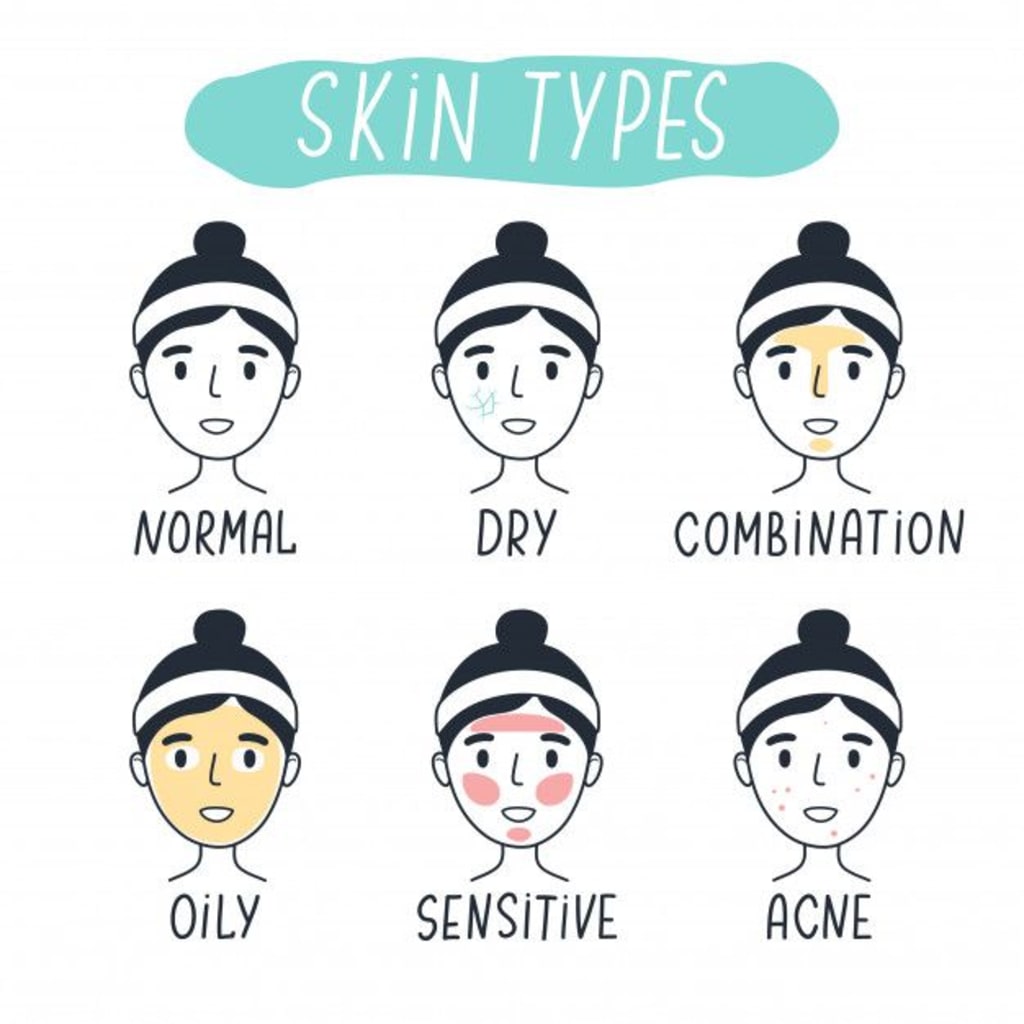Unveiling the Diversity of Skin Types and Nurturing Optimal Skin Health
Skin types and Skin care

Introduction:
Our skin, the largest organ of the human body, comes in a fascinating array of types, each with its unique characteristics and requirements. Understanding your skin type is essential for tailoring an effective skincare routine that addresses specific needs and promotes optimal skin health. In this comprehensive article, we explore the various skin types, their characteristics, and the best skincare practices to keep your skin radiant, nourished, and glowing.
The Different Skin Types:
a) Normal Skin: Often considered the ideal skin type, normal skin is well-balanced, neither too oily nor too dry. It has a smooth texture, minimal blemishes, and a healthy complexion.
b) Dry Skin: Dry skin lacks moisture and tends to feel tight and rough. It may appear dull, flaky, and may be prone to fine lines and wrinkles.
c) Oily Skin: Oily skin is characterized by excess sebum production, leading to a shiny, greasy complexion. It is more prone to acne breakouts and enlarged pores.
d) Combination Skin: Combination skin exhibits characteristics of both oily and dry skin. Typically, the T-zone (forehead, nose, and chin) is oily, while the cheeks and other areas may be dry or normal.
e) Sensitive Skin: Sensitive skin is easily irritated and reacts to various environmental factors, such as harsh products, weather changes, or allergens. It may be prone to redness, itching, and discomfort.
Determining Your Skin Type:
To determine your skin type, observe your skin's behavior throughout the day and after cleansing. Pay attention to factors such as oiliness, dryness, sensitivity, and pore size. Consulting with a dermatologist can also provide valuable insights into your specific skin type and concerns.
Skincare for Different Skin Types:
a) Normal Skin: Maintain the health of normal skin by focusing on hydration, protection from environmental damage, and maintaining a consistent skincare routine. Use a gentle cleanser, moisturizer, sunscreen, and incorporate antioxidants for added protection.
b) Dry Skin: Hydration is key for dry skin. Opt for creamy, nourishing cleansers, moisturizers rich in hydrating ingredients like hyaluronic acid, and incorporate gentle exfoliation to remove dead skin cells. Avoid hot water and harsh products that can further strip moisture.
c) Oily Skin: Balancing excess oil production is crucial for oily skin. Use oil-free cleansers to remove impurities, incorporate lightweight, non-comedogenic moisturizers, and use products with ingredients like salicylic acid to control oil and prevent breakouts. Regular exfoliation can also help unclog pores.
d) Combination Skin: Treat different areas of combination skin separately. Use gentle cleansers, lightweight moisturizers on oily areas, and richer moisturizers on dry areas. Exfoliate regularly to remove dead skin cells and balance the overall complexion.
e) Sensitive Skin: Gentle, fragrance-free products are essential for sensitive skin. Opt for mild cleansers, soothing moisturizers with ingredients like aloe vera or chamomile, and avoid harsh exfoliants or irritants. Perform patch tests before trying new products.
Essential Skincare Practices:
a) Cleansing: Cleanse your skin twice a day using a mild, pH-balanced cleanser suited to your skin type. Avoid harsh scrubbing and hot water, as they can strip away natural oils.
b) Moisturizing: Hydration is vital for all skin types. Choose a moisturizer that suits your skin type and apply it daily to nourish and protect your skin's barrier.
c) Sun Protection: Shield your skin from harmful UV rays by applying a broad-spectrum sunscreen with an SPF of 30 or higher, even on cloudy days. Reapply every two hours, especially when exposed to the sun.
d) Exfoliation: Regular exfoliation helps remove dead skin cells, allowing for better absorption of skincare products. Choose gentle exfoliators appropriate for your skin type and avoid over-exfoliating, which can lead to irritation.
e) Healthy Lifestyle Habits: Maintain a balanced diet, stay hydrated, get sufficient sleep, manage stress levels, and avoid smoking and excessive alcohol consumption. These habits contribute to overall skin health.
Seek Professional Guidance:
If you have persistent skin concerns or specific skin conditions, it's advisable to consult a dermatologist. They can provide personalized advice, prescribe targeted treatments, and recommend professional skincare procedures for optimal results.
Conclusion:
Understanding your skin type is the first step towards achieving radiant and healthy skin. By identifying the characteristics of your skin type and adopting appropriate skincare practices, you can address specific needs, protect against environmental factors, and maintain a youthful complexion. Embrace the diversity of skin types and nurture your skin with care, allowing its natural beauty to shine through. Remember, consistency and customization are key when it comes to skincare, so find what works best for you and embrace the journey towards optimal skin health.
About the Creator
Muqadas baloch
I am article writer and I am from pakistan subscribe me to keep updated from my newest stories.






Comments
Muqadas baloch is not accepting comments at the moment
Want to show your support? Send them a one-off tip.